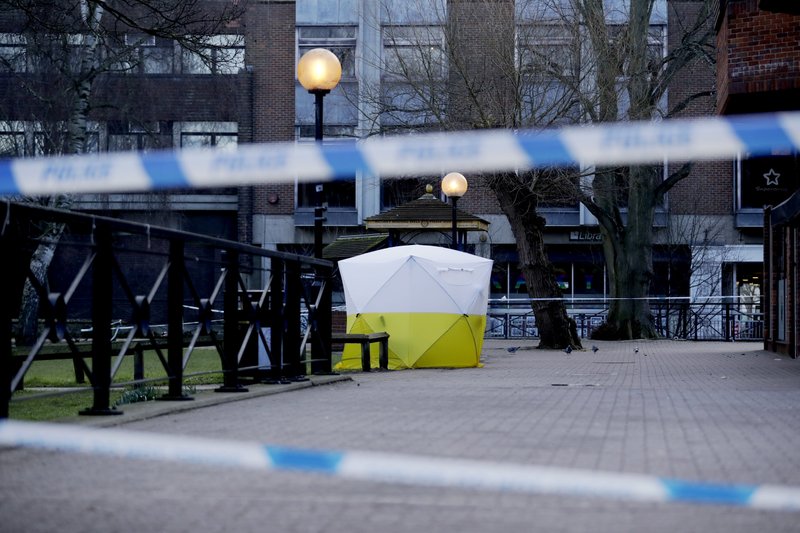LONDON — Around 21 people have received medical treatment after a nerve-agent attack on an ex-Russian spy, British police said Thursday, as the U.K. vowed strong action against whoever was responsible for the "brazen and reckless" act.
Three people remain hospitalized after the poisoning Sunday in the southern English city of Salisbury: former spy Sergei Skripal, his daughter and a British police officer who tried to help them.
Health authorities say there is little risk to the wider public. But Wiltshire county acting police chief Kier Pritchard said "around 21 people" have had treatment, including the Skripals, who were found unconscious on a bench.
Pritchard said "a number" of the 21 were having "blood tests, support and advice." Previously, authorities had said only that "several" people had sought treatment.
The ex-spy and his daughter remain in critical condition in a Salisbury hospital. A police officer who came to their aid, Sgt. Nick Bailey, is hospitalized in a serious condition, though he is conscious and talking, officials said.
British Home Secretary Amber Rudd said a large amount of resources is being devoted to determining who poisoned Skripal, 66, and his 33-year-old daughter Yulia. They were found unconscious on a bench, triggering a police inquiry headed by counterterrorism detectives.
"The use of a nerve agent on British soil is a brazen and reckless act," Rudd told Parliament. "This was attempted murder in the most cruel and public way."
Rudd said Britain would respond strongly when it is clear who is to blame.
The Russian Embassy in London, which has mocked other British politicians for suggesting Russian involvement, tweeted that it agreed with Rudd: "First evidence then conclusions on Mr. Skripal's case. Responsible political approach."
Police have refused to publicly speculate on who is behind the attack, but many experts have focused on Russia because of the similarity to the 2006 killing of another former Russian spy who was poisoned in London with radioactive polonium-210.
A public inquiry found that Russia was responsible for killing Alexander Litvinenko, and that President Vladimir Putin probably approved it.
The Russian government has denied any involvement in the Litvinenko killing or the attempted killing of Skripal, a former Russian agent who had served jail time in his homeland for spying for Britain before being freed in a spy swap.
Police and forensics officers are searching Skripal's home in Salisbury, a medieval city known for its towering cathedral, located 90 miles southwest of London, as well as a pub and a restaurant he and his daughter are believed to have visited Sunday.
Skripal, a former colonel in Russia's GRU military intelligence service, was convicted in 2006 of spying for Britain and imprisoned. He was freed in 2010 as part of a widely publicized spy swap in which the U.S. agreed to hand over 10 members of a Russian sleeper cell found operating in America in return for four Russians convicted of spying for the West.
Those who knew him in Salisbury were shocked, describing him as friendly and outgoing — hardly a man hiding out.
The owner of a local convenience shop frequented by Skripal described him as one of her favorite customers. Ebru Ozturk said she made sure to stock the food he liked, particularly smoked bacon and Polish salami.
"Usually he plays lottery and scratch cards," said Ozturk, 41. "Plus a few weeks he was lucky as well and laughed about it."
Read Friday's Arkansas Democrat-Gazette for full details.
